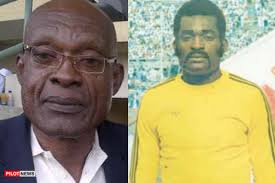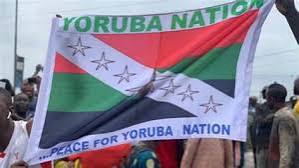Everything about these individuals speaks of quality service coupled with dexterity while they served. It’s, however, not clear where they could be at the moment; writes SUNNY IDACHABA.
Emmanuel Okala
Emmanuel Okala can be described as one individual who was among the early pioneers of the round leather game in Nigeria. To that extent, among the class of younger people known as ‘millenials’, Okala is an unknown name. He is however a former goalkeeper who played for the national football team between 1972 and 1980, and was subsequently named ‘Footballer of the Year’ after winning the 1980 African Cup of Nations tournament.
One fact that has remained a mystery about him till date is the true identity of his background. For instance, while he is being touted as a Nigerian from Anambra state, Onitsha, to be precise, a recent revelation indicates that Okala, alongside his brother, the late Patrick (also a goalkeeper), is actually from Idah in Kogi state. Both brothers were at various times in goal for the national team in the 80s and 90s. It remains an issue that he himself has to prove to Nigerians.
That notwithstanding, Okala, said to be in his 80s served the country meritoriously in the area of football. He brought solidity to goalkeeping that had never been witnessed before. His coming coincided with the era of the rise of goalkeeping excellence with the likes of Inua Rigogo, Peter Fregene, Amusa Adisa and Eyo Essien who were making waves at the time.
While describing the dexterity of Okala in the goal post, Mike Awoyinfa, a famous journalist said of him, “Okala easily picked balls from the air like a true African giraffe picking fruits effortlessly from the tallest tree. In spite of his height, Okala could dive like lightning to parry a ball away from entering his net. Okala was one giant goalkeeper who came into the world of soccer at a wrong time; a time when Nigeria football had not gone global; a time when our great footballers were all locals, thought local, acted local, played local and earned local incomes which were peanuts compared to what footballers like John Mikel Obi, Victor Moses and the likes of them earn today.”
Another sports writer, Jude Obafemi, said of Okala, “Everywhere he went, Okala carried his enormous stature and imposing influence with grace. His resilient spirit was infused into the very DNA of the Enugu club that the mere thought of a fixture against them was tension-inducing for other clubs in the league, especially as his imposing frame was the last line of defence between the goal posts.
“The width of his palm and the long fingers they held allowed Okala the leverage to easily wrap his gloves around a ball with one hand. When he spread both arms wide, he almost covered the goal posts. Kicking the ball out immediately placed it in the opposition area for the contest. To be honest, he launched many attacks from his post and his long reach was effective in intercepting crosses into his box. Attackers knew better than to run into him.
“Before he came to play for the national team, he had made impressionable marks with Enugu Rangers to win the 1977 African Winners Cup now CAF Confederations Cup thereby writing his name in the history of Nigerian football. This ex-footballer nicknamed ‘Iroko’ is a recipient of ‘Order of the Niger.”
As Okala’s role in football is being remembered, it’s, however, not clear where he could be at the moment, especially as the story of his root still remains a mystery.
Larry Koinyan
Air Vice Marshal Larry Koinyan is a former military officer with the Nigeria Air Force who voluntarily retired from service in 1988. This Niger Delta-born citizen from Bayelsa state is an ex-Air Force Chief and someone whose name is almost forgotten among retired former military officers because after his exit from public service, he went into a quiet life unlike his colleagues who found leisure in other public endeavours like politics. He enlisted in the Air Force in 1963 and had military, academic and professional training in Nigeria, Germany, US, UK and India.
All through his military career, he had served in various capacities, for example, as member, defunct Supreme Military Council (SMC) between 1984 and 1985 under General Muhammadu Buhari. He was also head of logistics, Air Force Headquarters between 1985 and 1986 when General Ibrahim Babangida assumed office as Head of State. During the same regime of IBB, Koinyan was a member of the Armed Forces Ruling Council (AFRC) between 1986 and 1988. While in that capacity, he was chairman, Directorate of Food, Roads and Rural Infrastructure (DFRRI) just before he left the service. Long after his retirement, no one heard anything about him until late President Musa Yar’Adua nominated him as chairman of Niger Delta Development Commission (NDDC) in 2008.
Unfortunately that appointment did not last long. Shortly after that, he was no longer seen in any public outing, not even available to comment on issues that concern the restive Niger Delta where he hails from thereby fuelling the question of where he could be and what he has been up to since then.
Yomi Edu
Chief Yomi Edu was the minister of commerce before he was deployed to the special duties ministry under the administration of former President Olusegun Obasanjo in 1999. To those who know this former minister from Lagos state, he is a simple man who follows the strict advice of his father when the man was alive. According to him, his father once admonished him after he was appointed minister saying, “This is not the time to rejoice. You can only rejoice when you leave office with your name intact, without blemish. Be mindful of what you do in government. Don’t get used to government privileges so that it would not be difficult for you to adjust when you leave.”
Edu, who is a close confidant of former vice-president Atiku Abubakar, is someone who says it all not minding whose ox is gored; for instance, long after he left the cabinet, in a widely published interview in 2003 about his perception of Chief Obasanjo, he said, “As a president of the country, he means some good things for Nigeria but as a leader, the answer is no. I wouldn’t follow him as a leader. He is vindictive, he doesn’t know loyalty and he is deceptive. However, as a Yoruba man, I am aware that we don’t fight our elders. Obasanjo is my elder and our president, so I cannot fight him. That is how we were taught in Yoruba land. I am thankful and grateful that among 140 million Nigerians, I was given a chance to be a minister.
“My experience was an eye opener because that was my first time in government. I learnt a lot in terms of how the government works and how decisions are taken. It was a useful experience personally.” For some time now, not much has been heard about him again




